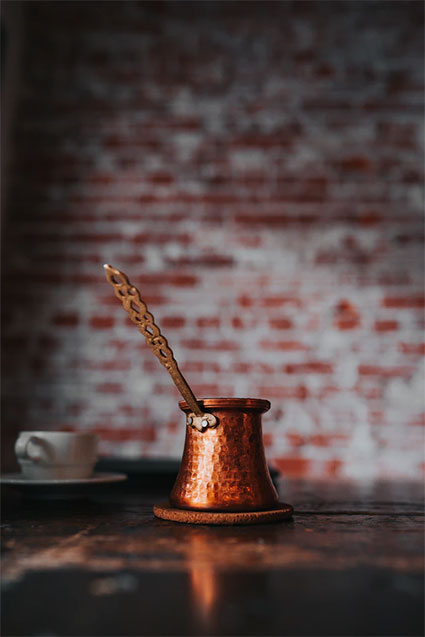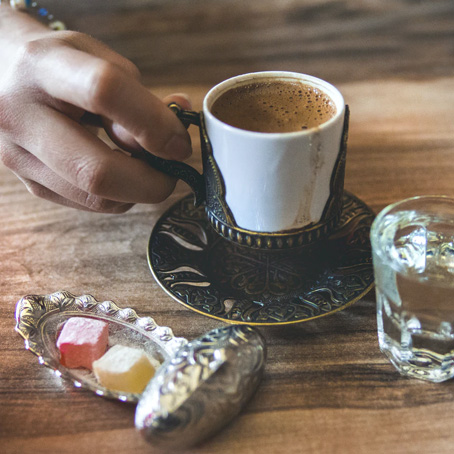A coffee that unites the peoples of the Mediterranean

Greek, Turkish or Arabic, this coffee belongs to the common heritage of many European, Asian and African peoples.
Until a few years ago, the word "coffee" in Greece meant only one thing: a cup of hot, steamed Greek coffee. And even if his omnipotence has declined, first because of frappe and then because of espresso, it has always been a favorite part of Greek tradition and coffee culture.
The coffee we call "Greek" is, of course, not our patent, but rather a common culinary heritage of the Mediterranean and Balkan countries, which is found in various variations, with small or large differences. The method of making "Greek" coffee may be listed in Unesco's list as "intangible cultural heritage" of Turkey, but the roots of this particular coffee are found in the Arabian Peninsula and are lost in the depths of time. If today it is called "Turkish", it is mainly due to the fact that this way of making coffee was widespread during the years of the Ottoman Empire, to the point that even today it is found in almost every country that has been part of the Empire for some years. Arabia and North Africa to Central Europe.
 Similarities and differences of Arab Cafe
Similarities and differences of Arab Cafe
The main characteristics of Arabic coffee are found in both its grinding and how it is prepared. Despite their individual differences, all the related coffees found in the Mediterranean basin and in the Balkan countries have huge similarities in taste, mainly due to two characteristics, which are the cream and the dregs.
Grinding: Grinding the coffee should be very, very thin, to the point that it resembles powdered sugar. Many argue that proper grinding is impossible to achieve with modern means, and that a specialized, manual grinding mill is required for this purpose.
How to make it: The method of preparation requires a special utensil, our well-known kettle (ibrik in Arabic and cezve in Turkish), in which the coffee boils with the water, without being filtered, with the exception of some North African countries, where coffee is strained before serving.
Kaimaki: Kaimaki is nothing more than the thick foam that is created on the surface of the kettle by boiling the coffee. In all the countries that share this preparation, the cream is considered desirable, while there are various "secrets" to achieve a better cream, such as intermittent boiling, beating the kettle on a hard surface, etc.
Coffee Remnants: The sediment is nothing more than the remnants of ground coffee. In most countries, the dregs are served with coffee, with the exception of some North African countries, where coffee is filtered and strained before serving. Based on the sediment, the old tradition of Cafémantia has evolved, which is also common in almost all coffee-sharing countries.
Sugar & Aromatics: In all countries, sugar is always added before brewing coffee, as we know well from our Greek. Spices are found mainly in the Arabian Peninsula and North Africa: cardamom, salepi and mastic are some of the most common, while anise and cinnamon are a bit rarer.
Recommendation of coffee: Traditionally, and for many years, Arabic coffee was prepared with 100% Arabica blends, which gave it a special character and aroma. However, in recent years, Robusta coffee has been widely used in Greek coffee blends, both for cost reduction purposes and for the fact that it helps to create a rich cream.
Well-known variations of Greek coffee from the Mediterranean and the Balkans!
Bosnia-Herzegovina: It is called Bosnian Coffee and its main variant is that the coffee is double-boiled with hot water, just before being served.
Czech Republic  and Slovakia: Coffee is called Tourek and differs from the classic Arabic coffee due to the fact that no kettle is used, but hot water is added directly to the glass with ground coffee. A similar method of preparation is found in Poland and Lithuania.
and Slovakia: Coffee is called Tourek and differs from the classic Arabic coffee due to the fact that no kettle is used, but hot water is added directly to the glass with ground coffee. A similar method of preparation is found in Poland and Lithuania.
Greek Coffee: Although until the 1960s it was called Turkish, the tension between the two countries' relations was called "Greek" coffee, which was supported by relevant advertising campaigns. Although not as popular today as in previous decades, it remains without a doubt an important part of Greek coffee culture.
Albanian Coffee: In the neighboring country, coffee is almost the same as what we call "Greek", with the only difference being the fact that Albanian coffee is darker and more bitter due to its intense roasting.
Other countries where Greek / Arabian coffee is found are Bulgaria, Croatia, Cyprus, Egypt, Georgia, Iran and Iraq, Israel and Lebanon, Northern Macedonia, Palestine, Slovenia, and Saudi Arabia. Arabia, Syria and Tunisia: a vast group of countries, covering a cycle centered on the Mediterranean Sea and a radius of many kilometers.
Coffee unites and strengthens human relationships. What else could bring to the same table Arabs, Africans, Jews, Albanians, Greeks, Turks and Bulgarians, Serbs, Czechs and Iraqis, if not a cup of steaming, delicious coffee?










